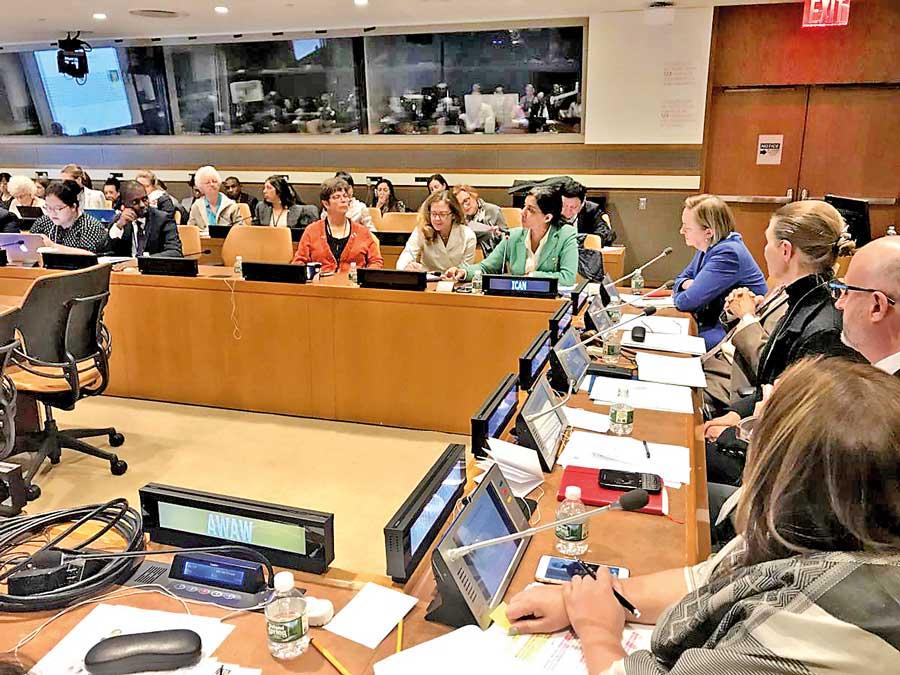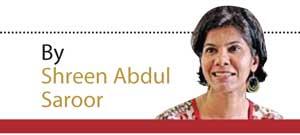Reply To:
Name - Reply Comment
Last Updated : 2024-04-23 22:35:00

Picture shows a discussion is underway to increase women in peacekeeping and peacebuilding (File photo)
When a peace deal is struck between warring factions, it is widely understood that amity has been achieved. However, when key sections of society—in most cases all women—are kept from the negotiating table, is that agreement likely to meet the needs of all citizens? As an individual who has lived through conflict from a young age, I have a different perspective on peace-building from those who have sat at the negotiating table on my behalf. 
Trying to address this problem two decades ago, the UN Security Council adopted Resolution 1325 on Women, Peace, and Security. Recognizing that women bear unique burdens of conflict and can offer critical insight on peace-building, UNSCR 1325 stressed the importance of ensuring that women participate in greater numbers at all stages of conflict resolution and post-conflict reconstruction. Since its passage, Resolution 1325 has become the organizing framework for thinking about women, peace, and security and is touted by the U.N. Security Council, U.N. Women, and other powerful international organizations. But while the impetus behind UNSCR 1325 may be sound, does its approach actually make things worse? Unfortunately, yes. The problem is conceptual. UNSCR 1325 defines security in terms of national security. But national security is not the same as individual security: unless a society treats its citizens equally, national security does not guarantee security for all. If we can agree that women bear a disproportionate burden of hardship and injustice in conflict, our priority should be reforming the structures that create those inequalities in the first place.
We know that women face sexual violence in conflict and untold hardships in post-conflict reconstruction. Their lands and resources are grabbed by the state or non-state actors. The dead and missing are more often men, leaving women to rebuild their lives in the patriarchal societies that marginalized them to begin with. When the state takes over natural resources or land and sea access in the name of post-conflict security, war-affected women often find themselves with no means of livelihood. Governments like mine set up factories in the name of development, plucking women from their homelands and reducing them to unskilled factory labour with no pathway for advancement. Thus, the same women who were uniquely vulnerable during war remain uniquely exploited after it. Recognizing their voices in conflict resolution and peace-building requires that we look at the broader context. That context includes not just physical security from violence but a transformation of their role in relation to the state. The drive for greater female representation in the armed forces—although ostensibly about female empowerment—works against women in the longer term, undermining arguments against violence. Indeed, the women’s peace agenda is best served by a reduction of armed and security personnel. The answer to war’s disproportionate impact on women should not be to deputize women as agents of war but instead to solicit women’s views to reduce violence and reshape the structures facilitating it.
In Sri Lanka, for example, Muslim women who for years protested the radicalisation of extremist youth were ignored by the state. When radicalized youth detonated bombs killing hundreds in churches and hotels, the state immediately responded with a repressive national security framework, restricting religious freedom, targeting refugee and asylum seekers for expulsion, and standing idle as manic but well-organised mobs burned Muslim owned businesses, homes, and schools. States like mine also routinely promote “counter-terrorism” laws and apply them disproportionately to arrest and detain minorities.
When their husbands are targeted, minority women become sole breadwinners and endure unannounced visits and harassment by security personnel. Adding women to the security apparatus will not change its basic character or incorporate women’s perspectives on peace and security. By defining the debate in terms of national security and working for greater participation of women in the security sector, UNSCR 1325’s influence is leading governments and international organizations, including UN Women, astray. It is incumbent on civil society stakeholders to argue for an
alternative framing.
What women need is not a token seat at the table, but rather a chance to offer real input in peace-building and conflict resolution. We need our values and experiences to be heard to dismantle the structures of oppression and violence that leave us uniquely vulnerable. This means a commitment to disarmament, demilitarization, war crimes accountability, human rights and dignity, livelihood assistance, land rights, cultural rights, inheritance and divorce reforms, and lasting efforts to repair war-torn societies to a place perhaps better than before. It is in shaping this process that women need to be heard.
Twenty years after UNSCR 1325, impunity persists for sexual and gender-based violence. Even as women have joined peacekeeping ranks in greater numbers, reports of rape and sexual violence against UN Peacekeeping forces and state security personnel persist.
And despite more women in the ranks, countries like mine maintain the same counter-productive counter-terrorism framework in their approaches to peace and security. Well-qualified women are encouraged to enter politics, but when they do, they are mocked, their intentions questioned, and forced to fight against the same patriarchal, discriminatory and often militarised structures their presence in politics seeks to change.
What gains are we making in addressing the very problems that UNSCR 1325 sought to correct? If we take an honest assessment, it is clear we need a better path forward, one that actually considers women’s perspectives in peace-building rather than treating them as placeholders in the same flawed approach.
The writer is a human rights activist and founder member of Women’s Action Network.

Add comment
Comments will be edited (grammar, spelling and slang) and authorized at the discretion of Daily Mirror online. The website also has the right not to publish selected comments.
Reply To:
Name - Reply Comment
On March 26, a couple arriving from Thailand was arrested with 88 live animal
According to villagers from Naula-Moragolla out of 105 families 80 can afford
Is the situation in Sri Lanka so grim that locals harbour hope that they coul
A recent post on social media revealed that three purple-faced langurs near t